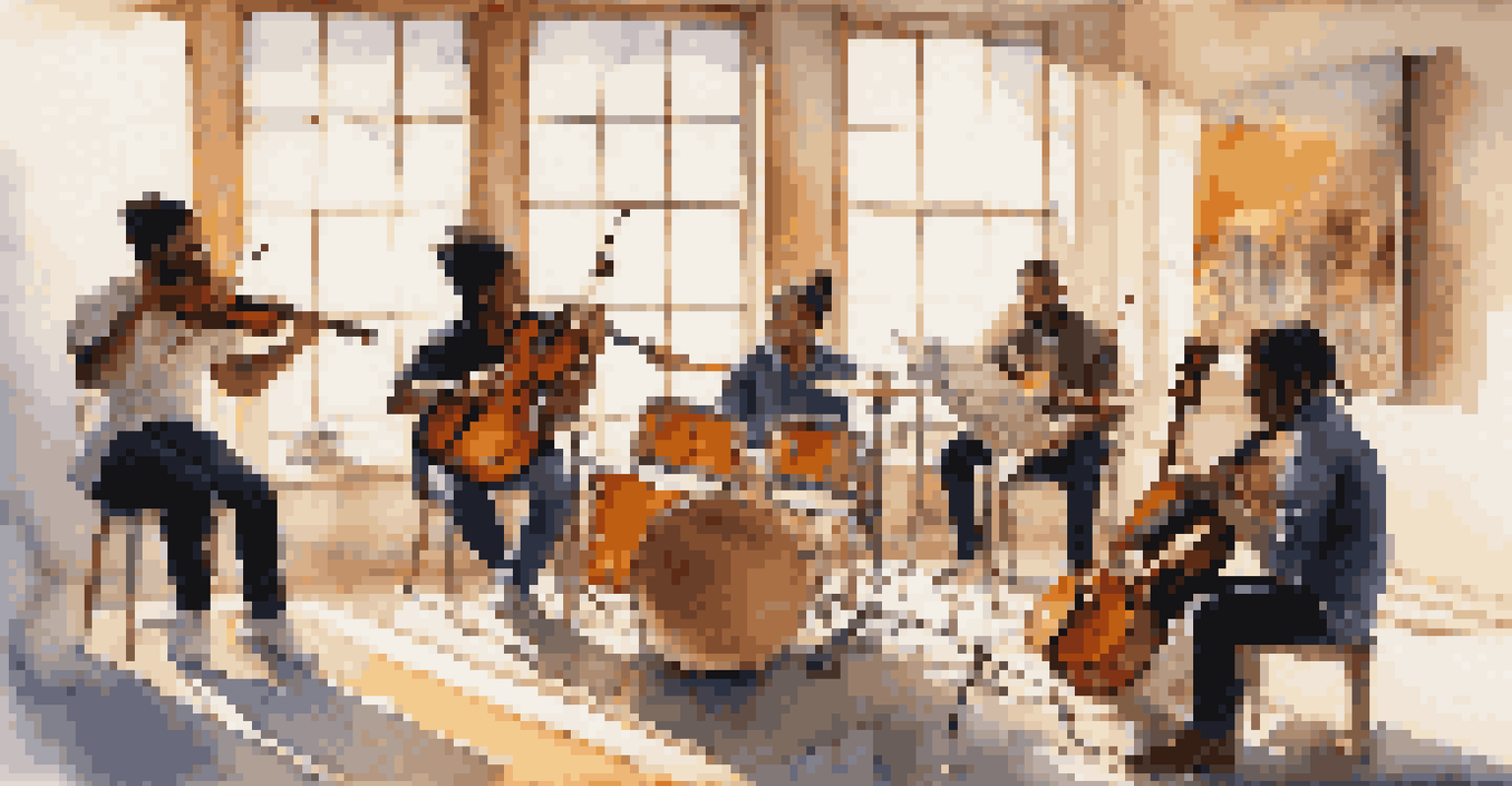Finding Your Voice: Tips for Authentic Music Composition

Understanding the Importance of Your Unique Voice
Every musician has a unique voice, which is the essence of their style and identity. Understanding this voice is crucial because it allows you to express your emotions and experiences authentically. Just like a fingerprint, your musical voice sets you apart from others in a crowded industry.
Music is the shorthand of emotion.
When you embrace your unique sound, you create a more personal connection with your audience. Think of artists like Billie Eilish or Ed Sheeran; their distinct styles resonate with listeners, making them memorable. This connection not only fosters a loyal fan base but also enhances your creative process.
Recognizing your unique voice is the first step in your musical journey. It’s about introspection and recognizing what influences you, whether that’s personal experiences, cultural backgrounds, or even your favorite genres. The more you understand yourself, the more effectively you can communicate through your music.
Exploring Different Genres to Discover Your Sound
One of the best ways to find your musical voice is by exploring various genres. Each genre has its own characteristics, which can inspire new ideas or techniques in your composition. For instance, listening to jazz might introduce you to complex rhythms, while folk music could inspire storytelling in your lyrics.

Don't be afraid to experiment! Mixing elements from different genres can lead to a unique sound that’s distinctly yours. For example, Taylor Swift successfully blended country with pop, creating a sound that appeals to a wider audience while still being true to herself.
Embrace Your Unique Voice
Your unique musical voice is essential for authentic expression and connecting with your audience.
As you explore different genres, pay attention to what resonates with you. Take notes on melodies, instruments, and lyrical themes that excite you. This exploration will not only broaden your musical palette but also guide you toward your authentic voice.
Journaling Your Thoughts and Emotions for Inspiration
Journaling is a powerful tool for any musician looking to find their voice. Writing down your thoughts and emotions can help clarify what you want to express in your music. It’s like a treasure chest of ideas waiting to be transformed into melodies and lyrics.
The only way to find your voice is to use it.
As you journal, don’t shy away from raw emotions. Whether it’s joy, sadness, or confusion, these feelings can lead to some of the most authentic songwriting. For instance, Adele's lyrics often stem from her personal experiences, which resonate with many listeners and add depth to her music.
Try setting aside a few minutes each day to write. You might discover recurring themes or stories that naturally lend themselves to songs. This practice not only enriches your songwriting but also helps you connect deeper with your own voice.
Collaborating with Other Musicians for Fresh Perspectives
Collaboration can be a game-changer in your music composition journey. Working with other musicians exposes you to different ideas and techniques that can help refine your voice. It’s like cooking; sometimes, adding a pinch of someone else's spice can elevate the dish you’re creating.
Consider seeking out musicians whose work you admire or who have a different style from yours. Their fresh perspective can challenge your thinking and encourage you to step outside your comfort zone. For example, many successful artists, like Jack Antonoff, are known for collaborating with a variety of artists to create unique sounds.
Explore Genres for Inspiration
Experimenting with different musical genres can help you discover and refine your distinct sound.
The key is to maintain an open mind during collaboration. Embrace constructive feedback and be willing to adapt your ideas. This flexibility can lead to unexpected creativity, helping you to discover elements of your voice you may not have realized existed.
Embracing Imperfection in Your Musical Journey
Perfectionism can be a significant barrier in finding your musical voice. Often, we get so caught up in making everything flawless that we lose the essence of our creativity. Remember, some of the most iconic songs have imperfections that make them relatable and authentic.
Think about famous tracks that weren’t perfect yet resonated deeply with audiences. Nirvana's 'Smells Like Teen Spirit' captured raw emotion, imperfections and all, creating a cultural phenomenon. These elements can evoke stronger feelings than a polished production.
Allow yourself to create freely without the pressure of perfection. Embrace the mistakes and consider them part of your artistic expression. This approach can foster authenticity, leading you closer to your true musical voice.
Practicing Regularly to Hone Your Skills and Style
Just like any other skill, finding your musical voice requires regular practice. Consistent practice helps you refine your techniques and encourages experimentation with different styles and sounds. Think of it as honing a craft; the more you practice, the sharper your skills become.
Set aside dedicated time each week to write and compose, even if it feels challenging at times. This discipline can lead to breakthroughs in your creativity. Many successful musicians have routines that include daily practice or songwriting sessions, which keeps their creativity flowing.
Practice and Share Your Music
Regular practice and sharing your music with others are crucial for honing your skills and finding your voice.
By committing to regular practice, you’ll not only improve your technical skills but also deepen your understanding of your musical identity. This journey of discovery is essential to finding the voice that resonates with you and your audience.
Listening to Your Inner Self for Genuine Expression
Listening to your inner self is crucial for authentic music composition. It’s about tuning into your instincts and feelings, allowing them to guide your creative process. This introspective practice can lead to more genuine and heartfelt music.
Consider taking moments of silence or meditation to reflect on your emotions and thoughts. This clarity can help you identify what you truly want to say with your music. For instance, artists like Hozier often draw from personal introspections, leading to songs that feel deeply personal and relatable.

Trusting yourself is key in this process. The more you listen to your inner self, the more confident you’ll become in your voice. This authenticity will shine through in your compositions, creating a powerful connection with your listeners.
Sharing Your Music and Growing Through Feedback
Once you’ve started to find your voice, sharing your music with others becomes essential. This process can be both nerve-wracking and exhilarating, but it’s a crucial step in your artistic journey. Feedback from listeners can provide valuable insights into how your music resonates.
Consider performing at open mics, sharing your tracks on social media, or collaborating with local artists. Each of these opportunities can help you gauge audience reactions and refine your sound. Many musicians have found their distinctive voice through audience interaction and constructive critiques.
Embrace the feedback, even if it’s challenging to hear at times. Use it as a learning experience to grow and evolve as an artist. Over time, this ongoing dialogue will help you refine your voice and solidify your identity in the music world.